US official says Iran must never obtain nuclear weapons
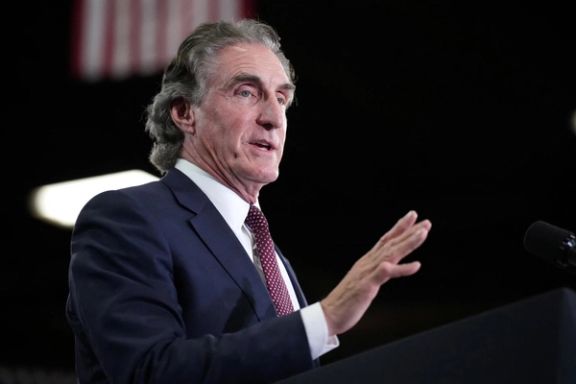
US Interior Secretary Doug Burgum said on Sunday that Iran must not obtain a nuclear weapon, calling it an “existential threat,” during remarks at the ADIPEC energy conference in Abu Dhabi.

US Interior Secretary Doug Burgum said on Sunday that Iran must not obtain a nuclear weapon, calling it an “existential threat,” during remarks at the ADIPEC energy conference in Abu Dhabi.
Burgum said Washington hopes dialogue can lead to “a world where we don’t have to worry about that,” while reaffirming the strategic importance of the Persian Gulf region to US interests.
He added that the United States supports reliable and affordable energy sources and is encouraging allies to trade in critical minerals rather than rely on adversaries.
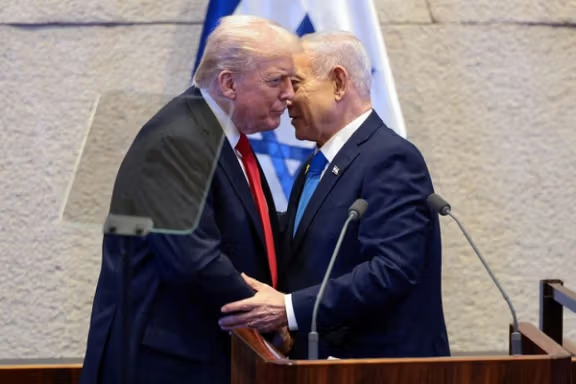
Iran’s foreign minister on Sunday accused Israel of misleading the United States on a fabricated Iranian nuclear threat and called on President Donald Trump to change course.
The United States held five rounds of negotiations with Tehran over its disputed nuclear program under a 60-day deadline set by President Trump earlier this year.
When no agreement was reached by the 61st day, Israel launched a surprise military offensive on June 13, followed by US strikes on June 22 targeting key nuclear facilities in Isfahan, Natanz, and Fordow.
"Israel targeted diplomacy because its real fear is the failure of its 'Iran Demonization Project,'" Iranian Foreign Minister Abbas Araghchi said in a post on his X account.
"POTUS entered office promising to put an end to Netanyahu's bamboozling of Obama and Biden. It's not too late to reverse course," he added.
The 12-day conflict ended on June 24 after a US-brokered ceasefire, but global alarm over Tehran’s nuclear program deepened as 400 kilograms of Iran’s highly enriched uranium remained unaccounted for.
Tehran says the material lies buried beneath debris from US and Israeli airstrikes, rendering it unreachable, yet it has so far refused to grant international inspectors access to the damaged sites.
Trump and Israeli Prime Minister Benjamin Netanyahu asserted that Tehran had resolved to race toward building nuclear weapons after they launched attacks on nuclear sites in a 12-day war in June.
The characterization appeared to contradict prior public US intelligence assessments. Iran denies seeking nuclear weapons.
In his Sunday remarks, Araghchi cited remarks by the UN nuclear watchdog's chief and Oman's foreign minister to reiterate Tehran's longstanding position that its nuclear program is for peaceful purposes.
"In the past 48 hours, the heinous lie that the unlawful Israeli and US bombing of Iran was motivated by an imminent nuclear threat has been thoroughly debunked by the International Atomic Energy Agency Chief, who has explicitly stated that Iran 'is not and was not' developing nuclear weapons, and my Omani counterpart, H.E. AlBusaidi, an intermediary trusted by both Iran and the US, who has made clear that there was never any Iranian "nuclear threat"."
Enough uranium for ten a-bombs
The UN atomic watchdog chief warned last week Iran holds enough uranium to build ten nuclear weapons if it chose to enrich further, but stressed that there was no sign Tehran seeks atomic arms.
In an interview with Swiss daily Le Temps, Rafael Grossi said Iran’s stockpile includes roughly 400 kilograms of uranium enriched to 60 percent, just short of weapons-grade.
“If it went further, Iran would have enough material for roughly ten nuclear bombs,” he added. “But we have no evidence that Tehran intends to build one.”
On Sunday, former advisor to Iran's Supreme Leader, Mohammad‑Javad Larijani, said Tehran has developed a new theoretical doctrine: one in which it chooses not to develop a nuclear weapon even though it is capable of building one in under two weeks.
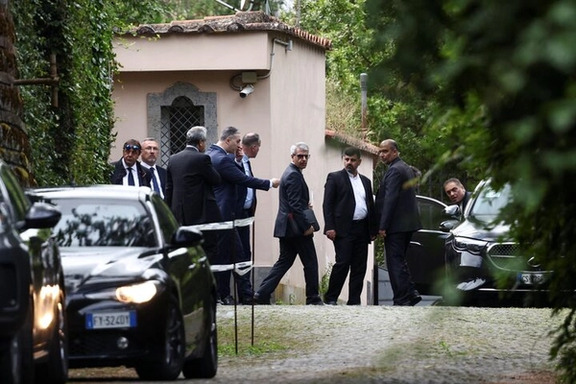
Iran’s government confirmed that the foreign ministry received messages related to possible negotiations, following reports in foreign media that Washington had conveyed a proposal to restart nuclear talks through Oman.
Tehran had received messages concerning the talks, Fatemeh Mohajerani, spokeswoman for President Masoud Pezeshkian’s administration, said on Sunday, but declined to identify the sender or disclosing any further details.
“Details about the nature and content of the messages will be provided at the appropriate time,” she told reporters.
Her remarks came after the Iraqi news outlet Baghdad Al-Youm, citing diplomatic sources in Tehran, reported on Friday that a message transmitted to Muscat expressed Washington’s willingness to resume nuclear negotiations with the Islamic Republic.
The US president Donald Trump had expressed his determination to reach a new agreement with Iran, the report said.
However, Tasnim News Agency, affiliated with Iran’s Revolutionary Guards, quoted an informed source on Saturday denying the report and saying that “no message has been sent by the United States through Oman.”
Oman and Qatar urge return to diplomacy
Oman’s foreign minister, Badr al-Busaidi, speaking on Saturday at Manama Dialogue conference in Bahrain, said his country hoped to return to negotiations between Iran and the United States. Oman has hosted five rounds of indirect talks between Tehran and Washington this year.
The planned sixth round in June, Al-Busaidi said, was halted after Israel’s attacks on Iran.
“Three days before the sixth round of talks was set to take place in June, Israel unleashed its bombs and missiles in an illegal and deadly act of sabotage,” he said.
The negotiations aimed at a new accord that would limit Iran’s nuclear activities in exchange for sanctions relief.
Western governments, including the United States, have accused Iran of pursuing nuclear weapons, while Tehran insists its program is solely for peaceful purposes.
Qatari prime minister and foreign minister Mohammed bin Abdulrahman Al Thani said on October 29 that Doha was working to bring both sides back to a new agreement.
“We are trying to engage with the United States and with the Iranians to make sure that the talks come back on track between the two countries, because I believe once we have the talks started, we can achieve an agreement,” Al Thani said at an event hosted by the Council on Foreign Relations think tank in New York.
“We can achieve a deal that will be better for everyone. For us in the region, for Iran, and for the United States,” Al Thani said. “Iran is my neighbor... for me, the stability of Iran is key. It’s not a luxury... it’s very important.”
Trump withdrew the United States from the 2015 nuclear deal between Iran and world powers, which had imposed strict limits on uranium enrichment in exchange for sanctions relief. In September, the United Nations reimposed its arms embargo and other sanctions on Iran over its nuclear program.
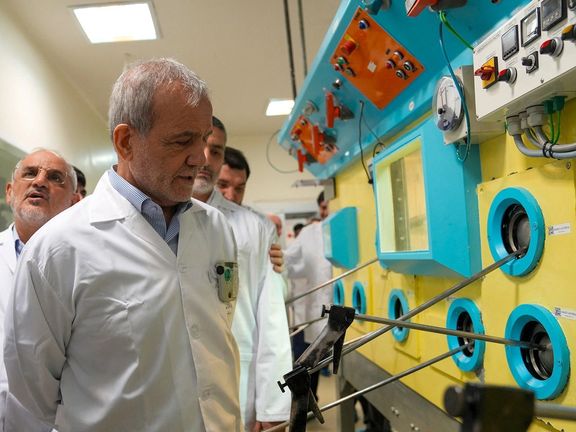
Iran is determined to rebuild its nuclear facilities, President Masoud Pezeshkian said on Sunday, stressing that the country’s program is peaceful and not aimed at a bomb.
Speaking during a visit to the Atomic Energy Organization of Iran, Pezeshkian said Tehran’s nuclear drive is intended to “meet the essential needs of the people and enhance national welfare.”
He said that while the destructive potential of nuclear technology is well known, “only a fraction of its applications relate to weapons,” and the rest serves medicine, agriculture, and industry.
The president’s remarks come amid heightened tensions with the West over Iran’s nuclear activity following the reimposition of UN sanctions and renewed scrutiny by the International Atomic Energy Agency (IAEA).
Pezeshkian said Iran’s nuclear scientists are working on the production of radiopharmaceuticals and medical isotopes, calling their efforts “a form of scientific jihad and sincere service to the nation.”
He rejected Western accusations that Iran seeks to develop nuclear arms, saying that “building a nuclear weapon is not on our agenda and they know this well.”
Instead, he accused global powers of using false claims to block Iran’s technological independence and maintain control over high-tech industries and markets.
Pezeshkian also criticized what he called the waste of national resources through excessive fossil fuel consumption and urged scientists to focus on clean technologies and renewable energy.
“We burn millions of barrels of oil and gas daily and ignore the potential of science to create added value,” he said, adding that this neglect fuels environmental damage and economic dependency.
The president vowed full government support for advancing the country’s peaceful nuclear program, saying that Iran must strengthen its position in the global market for radiopharmaceuticals and other nuclear-related technologies.
“With careful planning and the efforts of our scientists, we can expand our share of the international market,” he said.
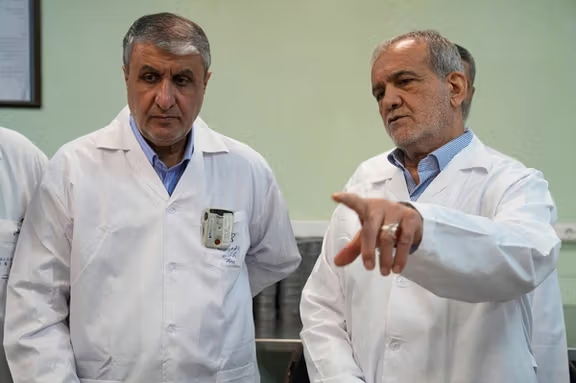
Iran plans eight new reactors
Iran plans to build eight new nuclear power plants in cooperation with Russia as part of a long-term strategy to expand its nuclear energy capacity, Mohammad Eslami, the head of the Atomic Energy Organization of Iran (AEOI), said on Sunday.
Eslami said the new facilities would be located along the country’s northern and southern coasts.
He told reporters that the projects are part of a roadmap to generate 20,000 megawatts of nuclear power by 2041.
Eslami said four of the planned reactors would be built in Bushehr -- home to Iran’s existing nuclear plant -- and four elsewhere, with site details to be announced later.
He added that Iran is also pursuing domestic projects, including a power plant in Darkhoveyn and a desalination project in Bushehr, aimed at addressing electricity and water shortages.
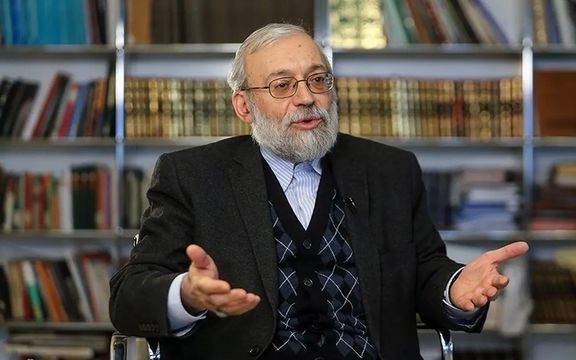
Former Iranian official Mohammad‑Javad Larijani said his country has developed a new theoretical doctrine: one in which a state capable of building a nuclear bomb in under two weeks chooses not to do so.
He pointed out that the fatwa by Supreme Leader Ali Khamenei against nuclear weapons has strong Shia jurisprudential foundations.
Larijani, a former senior judiciary official who also served as a top adviser to the Supreme Leader, added that he supports the expansion of Iran’s nuclear capabilities, framing them as a deterrent and emphasizing the country’s decision not to weaponize.
He also voiced sharp criticism of the 2015 nuclear deal, saying the so-called “diplomacy doctrine” of the Joint Comprehensive Plan of Action (JCPOA) had led Iran to “distress and reversed courage.”
Larijani, speaking at a conference examining the thoughts of Ali Khamenei, said that the JCPOA doctrine -- based on trading rights for concessions -- was akin to surrendering part of Iran’s rights in order to preserve others, and he invoked Iran’s war-era ethos of resisting aggressors.
Larijani’s comments reflect a nuanced position often heard from Tehran: while Iran signals that it remains technically close to nuclear weapon capability, it continues to assert that its policy remains peaceful and that the decision not to build such weapons stands.
The remarks come amid international scrutiny of Iran’s nuclear program, where questions remain over enrichment levels and stockpiles, and where the authenticity and legal force of Khamenei’s so-called fatwa have been contested by analysts.
International experts say the Iranian stance complicates diplomatic efforts, as Tehran’s acknowledgement of capability but insistence on conditional restraint leaves room for ambiguity.
Critics argue this could be designed to serve both as deterrence and diplomatic leverage.
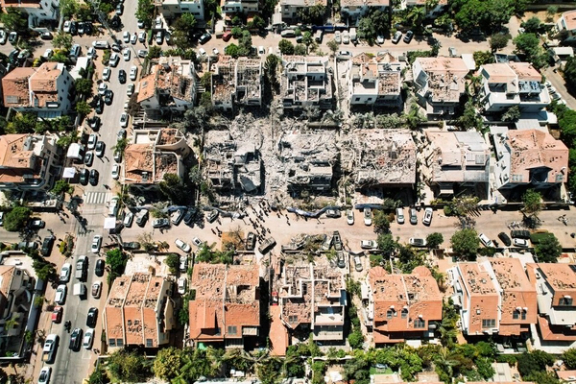
Tehran seeks peace but will deliver a decisive response if attacked, Iran’s deputy foreign minister said in an interview with CTV Belarus on the sidelines of the Eurasian Security Conference in Minsk, according to Iranian media.
The recent confrontation in June had shattered long-standing assumptions about Israel’s military power, Saeed Khatibzadeh said.
“The myth of Israel’s invincibility collapsed after Iran’s response,” he added, describing Tehran’s military action as a turning point that proved Iran’s capacity to retaliate.
Earlier this year, the United States held five rounds of negotiations with Tehran over its disputed nuclear program under a 60-day deadline set by President Donald Trump.
When no agreement was reached by the 61st day, on June 13, Israel launched a surprise military offensive, followed by US strikes on June 22 targeting key nuclear facilities in Isfahan, Natanz, and Fordow.
“Iran has no choice but to secure a decisive victory against the aggressor,” Khatibzadeh said, arguing that any attack on Iran would be met with a response aimed at ensuring that “the aggressor will undoubtedly regret its decision.”
‘We are peace-seeking, but we fight well’
Iran does not seek confrontation but will not hesitate to defend itself, Khatibzadeh said. “We are a peace-seeking people, but if war is imposed on us, we fight well… We never sought confrontation, but they chose the path of confrontation.”
The deputy minister linked Iran’s stance to what he called the “geopolitical ambitions” of the United States and Israel, urging other countries to recognize Iran’s right to defend itself.
“We have never accepted the language of force,” he said. “Our message is clear: respect, justice, and balance must define international relations.”
The 12-day conflict ended on June 24 after a US-brokered ceasefire, but global alarm over Tehran’s nuclear program deepened as 400 kilograms of Iran’s highly enriched uranium remained unaccounted for.
Tehran says the material lies buried beneath debris from US and Israeli airstrikes, rendering it unreachable, yet it has so far refused to grant international inspectors access to the damaged sites.